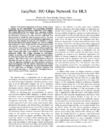
Open access
Date
2021Type
- Conference Paper
ETH Bibliography
yes
Altmetrics
Abstract
The massive deployment of FPGAs in data centers is opening up new opportunities for accelerating distributed applications. However, developing a distributed FPGA application remains difficult for two reasons. First, commonly available development frameworks (e.g., Xilinx Vitis) lack explicit support for networking. Developers are, thus, forced to build their own infrastructure to handle the data movement between the host, the FPGA, and the network. Second, distributed applications are made even more complex by using low level interfaces to access the network and process packets. Ideally, one needs to combine high performance with a simple interface for both point-to-point and collective operations. To overcome these inefficiencies and enable further research in networking and distributed application on FPGAs, we first show how to integrate an open-source 100 Gbps TCP/IP stack into a state-of-the-art FPGA development framework (Xilinx Vitis) without degrading its performance. Further, we provide a set of MPI-like communication primitives for both point-to-point and collective operations as a High Level Synthesis (HLS) library. Our point-to-point primitives saturate a 100 Gbps link and our collective primitives achieve low latency. With our approach, developers can write hardware kernels in high level languages with the network abstracted away behind standard interfaces. To evaluate the ease of use and performance in a real application, we distribute a K-Means algorithm with the new stack and achieve a 1.9X and 3.5X throughput increase with 2 FPGAs and 4 FPGAs respectively. Show more
Permanent link
https://doi.org/10.3929/ethz-b-000487920Publication status
publishedExternal links
Book title
2021 31st International Conference on Field-Programmable Logic and Applications (FPL)Pages / Article No.
Publisher
IEEEEvent
Organisational unit
03506 - Alonso, Gustavo / Alonso, Gustavo
Notes
Conference lecture held on September 2, 2021More
Show all metadata
ETH Bibliography
yes
Altmetrics
